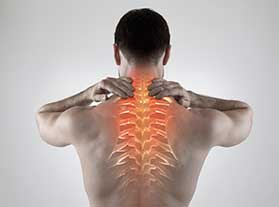Disc Degeneration Treatment in Lutz, FL

Disc degeneration (spondylosis) is really considered a condition rather than a disease. Since the condition's name is also used to describe wear and tear to discs in general, everyone experiences a certain amount of the condition over time with the aging process. However, the speed of the degeneration, either for better or worse, is impacted by lifestyle choices, injury and in some cases, heredity. In some cases, the pain and symptoms of disc dgeneration don't increase over time. In cases where the pain and symptoms are increasing, disc degeneration is often named as the explanation.
Disc degeneration is a condition affecting the wear and tear of spinal discs. While not an actual disease, disc degeneration affects almost everyone to some capacity as they age.
The root of the issue is connected to a part of the spine called an intervertebral disc. Disc degeneration involves one or several discs. Intervertebral discs are discs that fit in between each of the vertebrae of your spine. They are made up of about 80 percent water, and function much like a shock absorber in a car. Over time, the intervertebral discs dry out. Excessive pressure or injuries can also cause small tears in the outer portion of the intervertebral discs. When these small tears heal, scar tissue develops. The body does some natural repairs on its own using scar tissue. However, the scar tissue is not as strong as the original outer portion of the intervertebral discs.
As time progresses, the cycle of damage and repair eventually causes the vertebrae above and below to move closer together, narrowing the space in between them. Eventually, this can result in back pain, pain radiating down arms or legs, neck pain and other symptoms.
Disc Degeneration Prevalence
In most cases, the degenerative process doesn't really start to become noticeable until a person reaches their 60s. However, there are instances of adults in their 20s and 30s who begin to experience the condition sooner, especially if they have a highly active lifestyle. Studies show that smokers are more likely to contract the condition than non-smokers.
Disc Degeneration Symptoms
The symptoms of the condition vary from person to person. It's possible for a person with disc degeneration to have very little or no pain, while others experience pain so severe that it interferes with going about their daily activities. Interestingly, as a person ages, the pain has been known to decrease because the disks dry out.
The pain can begin in one of the following ways:
- A major injury that brings on unexpected and sudden pain
- A minor injury that results in sudden pain
- Pain that starts slowly and gradually becomes worse
Some of the most common symptoms include:
- Pain in the lower back, buttocks and thighs, especially if it radiates down your legs
- Neck pain, especially if it radiates into your arms and hands
- Pain that increases when lifting, bending or twisting
- Pain that decreases when you change positions or lay down
- Severe pain that comes and goes. This may last from a few days to a few months
- Numbness and tingling, especially in hands, fingers, feet and toes
- Weakness in your leg muscles or you experience foot drop
Disc Degeneration Diagnosis
The sooner the condition is diagnosed and action is taken to slow the process, the better the results and quality of life you'll experience. Your healthcare provider will most likely want to begin with a physical exam involving:
- Range of motion
- Physical strength
- Intensity of pain
- Sensory perception
- Reflexes
- Motor skill
There will also likely be diagnostic tests such as an x-ray and MRI to help determine the root cause of the symptoms and pain.
Disc Degeneration Treatment
There are multiple options available to help slow the process of the degenerative disc condition that are both traditional and alternative:
- Aspirin or ibuprofen for pain management and to reduce swelling
- Naproxen
- Muscle relaxants
- Epidural Steroid Injections (ESI)
- Chiropractic manipulation (spinal adjustment)
- Hot and cold packs
- Flaxseed oil and vitamin E supplements to help reduce swelling
- Physical Therapy
- Exercise such as walking and yoga
Request more information about Disc Degeneration today. Call (727) 240-3424 or contact Dr. Lisa Maharajh online.
Maharajh Acupuncture & Herb Shoppe
Address
5805 Main StNew Port Richey, FL 34652
(727) 240-3424
www.maharajhacupuncture.com
Hours
Mon:
10:00 am - 5:00 pm
Tue:
10:00 am - 5:00 pm
Wed:
10:00 am - 5:00 pm
Thu:
10:00 am - 6:00 pm
Fri:
10:00 am - 3:00 pm
Sat:
Closed
Sun:
Closed


